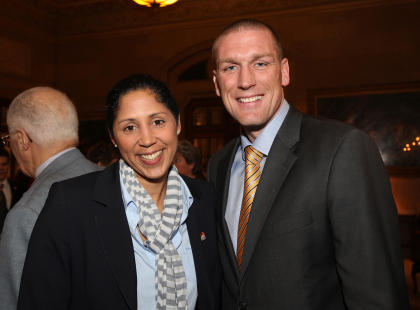De Vos a familiar voice ready to rattle the grassroots of Canadian soccer
Over the course of a long career in football, Jason de Vos has filled a lot of roles: standup central defender, captain, winner, licensed coach and popular media analyst and critic. In every one of them, he’s been someone who wasn’t afraid to speak up -- to get stuck in, as the game’s vernacular puts it.
Now, with international soccer’s transfer window poised to shut, de Vos is the Canadian Soccer Association’s prize signing to a new position as the organization's first Director of Development. In a country where regional interests in the sport have historically gotten in the way of the greater good, it’s hard to imagine a more credible, made-in-Canada face to put in this role, or one who comes in more prepared or more eager for the task ahead.
“It’s a big change in my life, but I’m really looking forward to the opportunity to put words into action,” de Vos said Tuesday in a phone interview. “That’s what excites me the most. I now get to start living some of the principles I’ve been preaching about.”

The principles were hard-earned, and are reflected in the c.v. he brings to the job. It’s uncommonly deep for a man of 42 years old, and less than a decade removed from a pro playing career in which he climbed the ladder from London (Ont.) Lasers beginnings at age 16 to captaining Canada, and scoring the winning goal at the 2000 Gold Cup, with stops in between playing for English clubs from Charlton to Ipswich to Wigan, in Scotland at Dundee United and back on home soil with Montreal.
Since hanging up the boots eight years ago he’s gained various certifications, done grunt work on Ontario Soccer Association committees and served as a special assistant with John Herdman’s women’s national team. On social media he’s emerged as a strong voice for grassroots player development, advocating for skills over keeping score, while teaming with Kristian Jack on TSN as perhaps the most perceptive one-two broadcasting tandem in any sport on the continent (about the only down side to the news is purely selfish -- de Vos, after a couple more commitments in September, will pretty much disappear from regular TV work, and the airwaves will be thinner for his absence).
It’d be a stretch to now call de Vos the country’s soccer czar, but there are elements of that here. He’s been given a blank canvas of sorts in terms of coaching education, club and long-term player development and high-performance oversight, in a country where the game’s progress has in the past been held up by a patchwork of conflicting approaches and policies across the country.
Those days aren't completely behind, but the times finally appear to be changing under a governance model overseen now by CSA president Victor Montagliani and general secretary Peter Montopoli.
“That’s really where the focus of my job is going to lie - creating a system of player and coach development from the grassroots level right up to our national team level that’s going to allow us to maximize our potential," said de Vos. “There’s been some fantastic work that’s been done by people before me and I’m going to look to carry on that work and try to utilize some of the untapped resources we have in our country in terms of the knowledge and experience that’s there, and really try and connect people from coast to coast. We’ve never really taken that approach before.
“You’ve often heard people saying we need to do what they do in Germany, or Spain, or Holland or the United States -- what that fails to recognize is we’re not any of those countries. We’re Canada and we have a very unique culture that I believe is the best in the world and I’m sure a lot of people would agree. Why would we want to change that? We should embrace our culture, embrace our diversity … if we can do that, I think we can be very successful.”
At the Rio Olympics, the women demonstrated how systematic player development (via the EXCEL programme) can deliver a new generation of young players ready to take on the world. This weekend’s round of World Cup qualifiers will offer another hint of where the men are on that same track, in a deeper global football world where Canada is playing catch-up while smaller nations like Iceland, Denmark and the like prove it’s possible to punch above their weight class given proper organization and resource management.
“I think it’s always going to be a challenge for us to make up that ground in the men’s game,” said de Vos, “but I do like a lot of the work that’s being done with our national youth teams going all the way down to the U-15 level, getting kids more international exposure so that it’s not a culture shock to them when they have to go into places like Honduras and get a result when they’re a senior men’s national player.
“We have to be open-minded, we have to embrace change, because what we’ve been doing over the last 20, 40, 50 years hasn’t kept us on pace with the best in the world.”
At least it’s an environment that can finally be said to be conducive to giving Canada a seat at the table around the world’s biggest game. It’s also crying out for a voice like Jason de Vos, and make no mistake -- he will get stuck in, and the game should be better for it.

 Yahoo Sports
Yahoo Sports 

